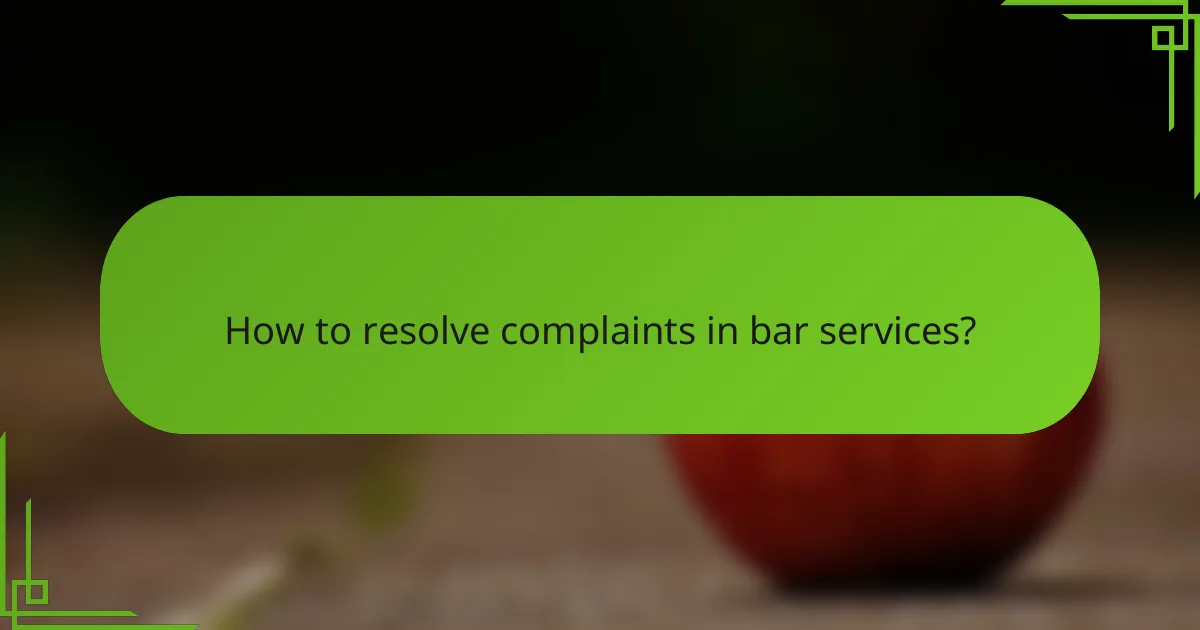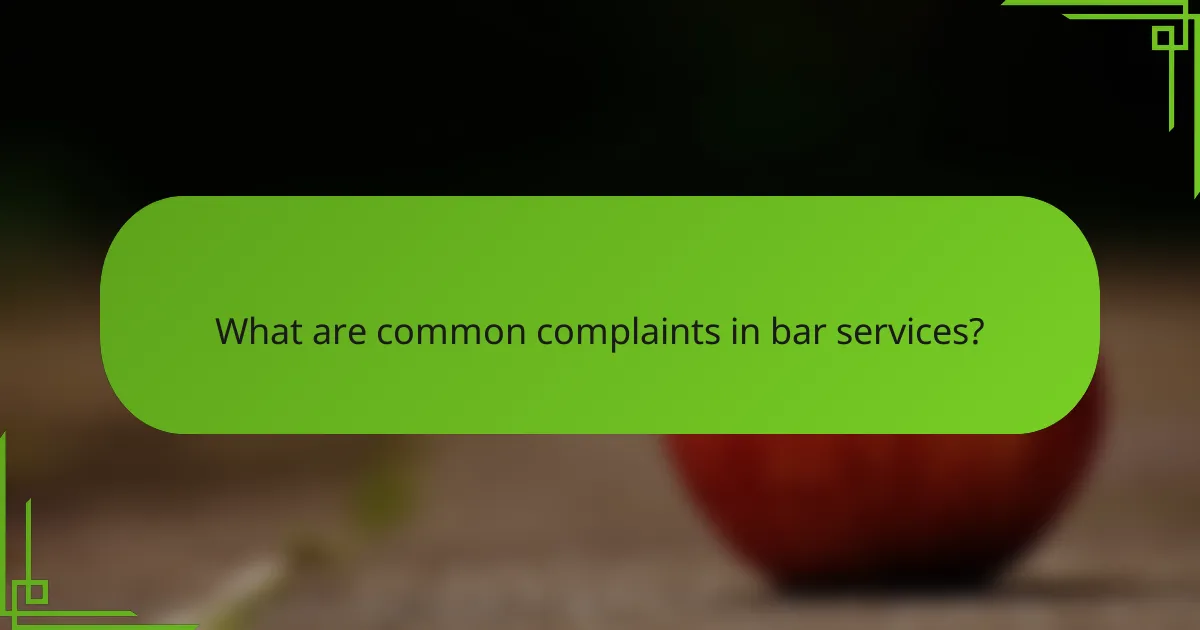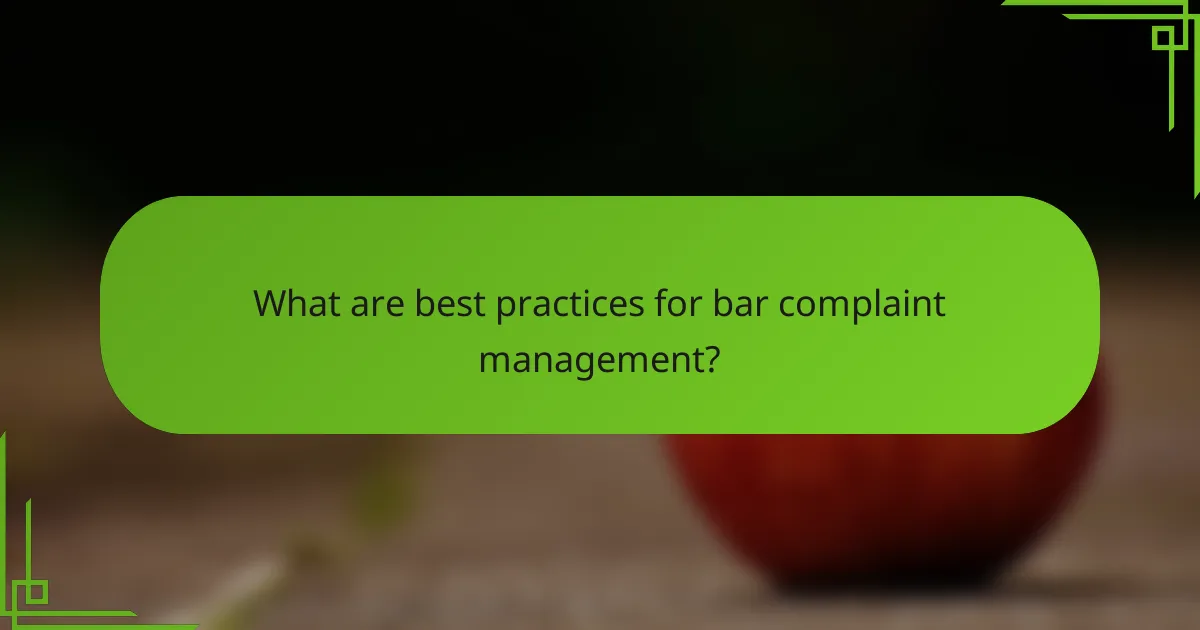In the competitive landscape of bar services, effectively resolving customer complaints is crucial for maintaining satisfaction and loyalty. By prioritizing prompt attention and clear communication, establishments can create a welcoming environment where patrons feel valued. Implementing strategies such as staff training and feedback systems further enhances the overall experience, addressing common issues like service delays and drink quality to foster lasting relationships with customers.

How to resolve complaints in bar services?
Resolving complaints in bar services involves prompt attention, effective communication, and structured follow-up. Addressing issues quickly can enhance customer satisfaction and loyalty, ensuring patrons feel valued and heard.
Immediate response protocols
Immediate response protocols are essential for addressing complaints as soon as they arise. Staff should be trained to acknowledge complaints within minutes, showing customers that their concerns are taken seriously. For instance, if a drink is served incorrectly, a bartender should apologize and offer a replacement without delay.
Establishing a clear protocol can include greeting the customer, listening actively, and confirming understanding of the issue. This approach helps to diffuse tension and sets a positive tone for resolution.
Effective communication techniques
Effective communication techniques involve active listening and empathetic responses. Staff should maintain eye contact, use a calm tone, and avoid interrupting the customer while they express their concerns. Phrases like “I understand how you feel” can help in validating the customer’s experience.
Using open-ended questions can also encourage customers to elaborate on their complaints, providing more context for resolution. For example, asking “What can I do to make this right?” invites collaboration in finding a solution.
Escalation procedures
Escalation procedures are necessary when frontline staff cannot resolve a complaint satisfactorily. Establish a clear hierarchy for escalating issues to managers or supervisors who have the authority to offer compensation or alternative solutions. This ensures that more complex complaints receive appropriate attention.
Staff should be trained on when and how to escalate complaints, ensuring a smooth transition for the customer. For example, if a customer is unhappy with a manager’s decision, they should know how to involve a higher authority, such as the bar owner.
Follow-up strategies
Follow-up strategies are crucial for ensuring customer satisfaction after a complaint has been addressed. A simple follow-up can be done through a quick chat during their next visit or a personalized message if contact information is available. This shows the customer that their feedback is valued and taken seriously.
Consider implementing a feedback system, such as a short survey, to gather insights on the complaint resolution process. This can help identify areas for improvement and enhance overall service quality.
Documentation practices
Documentation practices are vital for tracking complaints and resolutions. Keeping a log of complaints can help identify recurring issues and inform staff training. Each entry should include details such as the nature of the complaint, the resolution provided, and any follow-up actions taken.
Regularly reviewing this documentation can help bar management identify trends and implement proactive measures to prevent similar complaints in the future. For instance, if multiple customers report slow service, additional staff may be needed during peak hours.

What strategies improve customer satisfaction in bars?
Improving customer satisfaction in bars involves implementing effective strategies that enhance the overall experience. Key approaches include staff training, customer feedback systems, personalized service, and quality control measures.
Staff training programs
Staff training programs are essential for equipping employees with the skills needed to provide excellent service. Regular training sessions can cover topics such as customer interaction, drink preparation, and conflict resolution. Investing in staff development often leads to higher employee morale and better customer experiences.
Consider implementing role-playing scenarios during training to simulate real-life situations. This hands-on approach helps staff practice their responses and improves their confidence in handling various customer interactions.
Customer feedback systems
Customer feedback systems allow bars to gather insights directly from patrons about their experiences. This can be achieved through comment cards, online surveys, or digital platforms that encourage reviews. Regularly analyzing this feedback helps identify areas for improvement and enhances service quality.
To effectively utilize feedback, establish a routine for reviewing comments and suggestions. Aim to address common concerns promptly, which demonstrates to customers that their opinions are valued and taken seriously.
Personalized service approaches
Personalized service approaches focus on tailoring the customer experience to individual preferences. This can involve remembering regular customers’ favorite drinks or making recommendations based on their tastes. Such attention to detail fosters a welcoming atmosphere and encourages repeat visits.
Implementing a loyalty program can also enhance personalization. Offering rewards for frequent visits or special promotions for birthdays can make customers feel appreciated and more connected to the bar.
Quality control measures
Quality control measures ensure that the products and services offered meet a consistent standard. This includes regular checks on drink preparation, cleanliness, and overall ambiance. Maintaining high standards helps build trust and satisfaction among customers.
Establish a checklist for staff to follow during shifts, covering aspects like inventory checks and cleanliness protocols. Regularly reviewing these measures can help identify potential issues before they affect customer satisfaction.

What are common complaints in bar services?
Common complaints in bar services often revolve around service delays, drink quality issues, staff behavior problems, and ambiance and cleanliness concerns. Addressing these issues effectively can significantly enhance customer satisfaction and loyalty.
Service delays
Service delays occur when customers wait longer than expected for their orders. This can lead to frustration and dissatisfaction, especially during peak hours when patrons expect prompt service. Bars should aim for wait times of under 10 minutes for drink orders to maintain a positive experience.
To mitigate delays, staff should be trained in efficient order-taking and multitasking. Implementing a streamlined ordering system or using technology, such as tablets for order entry, can help reduce wait times significantly.
Drink quality issues
Drink quality issues arise when beverages do not meet customer expectations in terms of taste, presentation, or consistency. Common problems include poorly mixed cocktails, watered-down drinks, or using low-quality ingredients. Bars should prioritize using fresh, high-quality ingredients to ensure customer satisfaction.
Regular training sessions for bartenders on drink preparation and presentation can help maintain high standards. Encouraging customer feedback on drink quality can also provide valuable insights for improvement.
Staff behavior problems
Staff behavior problems encompass a range of issues, including rudeness, lack of attentiveness, or unprofessional conduct. Such behavior can tarnish the overall experience and drive customers away. It is crucial for bar staff to be trained in customer service skills and maintain a friendly demeanor.
Establishing clear guidelines for staff behavior and regularly assessing performance through customer feedback can help address these issues. Recognizing and rewarding good service can also motivate staff to uphold high standards.
Ambiance and cleanliness concerns
Ambiance and cleanliness concerns refer to the overall environment of the bar, including noise levels, lighting, and cleanliness of the space. A cluttered or dirty bar can deter customers and negatively impact their experience. Regular cleaning schedules and attention to detail are essential for maintaining a welcoming atmosphere.
Creating a comfortable ambiance involves balancing lighting, music volume, and seating arrangements. Regularly soliciting customer feedback on the atmosphere can help identify areas for improvement and enhance the overall experience.

How do local regulations affect bar complaint resolution?
Local regulations play a crucial role in bar complaint resolution by establishing the framework within which bars operate and respond to customer grievances. These regulations dictate the procedures for handling complaints, ensuring that bars maintain standards that protect both patrons and their business interests.
Licensing requirements
Licensing requirements vary by region and dictate the legal obligations bars must fulfill to operate. These licenses often include stipulations on how complaints must be documented and addressed, which can influence the speed and effectiveness of resolution processes. For example, a bar in New York may need to adhere to specific protocols outlined by the State Liquor Authority, while a bar in London must comply with local council regulations.
Failure to comply with licensing requirements can lead to penalties, including fines or suspension of the license, which can further complicate complaint resolution. Bars should regularly review their licensing obligations to ensure compliance and facilitate smoother complaint handling.
Health and safety standards
Health and safety standards are essential for maintaining a safe environment in bars and directly impact how complaints are managed. Regulations often require bars to implement safety protocols, such as proper food handling and sanitation practices, which can affect customer satisfaction. If a patron raises a complaint regarding health issues, the bar must follow specific procedures to investigate and resolve the matter.
For instance, if a customer reports food poisoning, the bar must document the complaint and may be required to notify health authorities. Adhering to health and safety regulations not only helps in resolving complaints efficiently but also protects the establishment from potential legal repercussions.
Consumer protection laws
Consumer protection laws are designed to safeguard patrons’ rights and ensure fair treatment in bars. These laws often require bars to address complaints promptly and transparently, providing customers with clear avenues for recourse. For example, if a customer feels they were overcharged, consumer protection regulations may mandate that the bar investigates the claim and offers a resolution.
Bars should familiarize themselves with local consumer protection laws to avoid potential disputes and enhance customer satisfaction. Implementing a clear complaint resolution policy that aligns with these laws can help bars build trust with their patrons and improve overall service quality.

What are best practices for bar complaint management?
Best practices for bar complaint management focus on addressing customer concerns promptly and effectively. Implementing proactive strategies and ensuring staff are well-trained can significantly enhance customer satisfaction and loyalty.
Proactive complaint handling
Proactive complaint handling involves anticipating potential issues before they escalate. This can include regularly seeking customer feedback through surveys or informal conversations, allowing staff to address concerns immediately.
Establishing a clear process for reporting and resolving complaints is crucial. For instance, having a designated staff member responsible for handling complaints can streamline the process and ensure consistent follow-up with customers.
Regular staff training
Regular staff training is essential for effective complaint management. Training should cover communication skills, conflict resolution techniques, and product knowledge to empower employees to handle complaints confidently and competently.
Consider conducting training sessions every few months, incorporating role-playing scenarios to simulate real-life situations. This approach helps staff practice their responses and learn how to maintain a positive atmosphere even when dealing with difficult customers.


